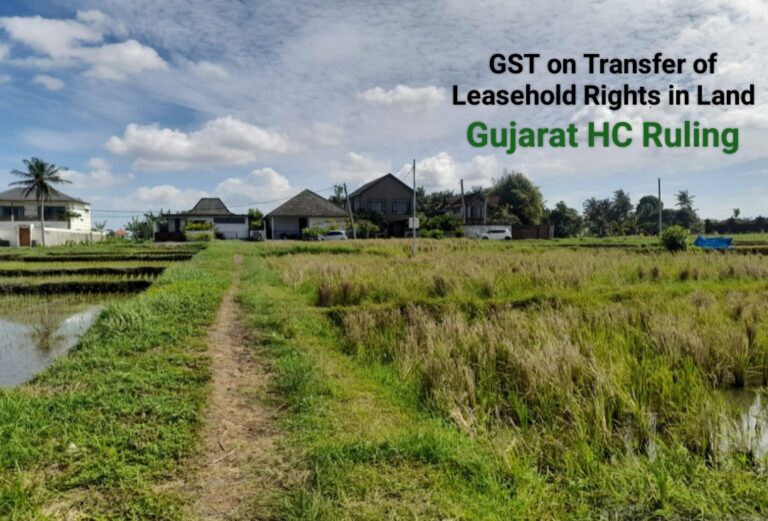The Gujarat High Court’s landmark judgment on GST on leasehold land transfers offers a pivotal resolution to industries grappling with unjust tax burdens. Industry stakeholders are now awaiting definitive clarity from the Supreme Court and CBIC on this matter.
In a significant legal breakthrough, the Gujarat High Court has ruled that Goods and Services Tax (GST) does not apply to the transfer of leasehold rights to a third party on land provided by the Gujarat Industrial Development Corporation (GIDC). This landmark judgment in the case of Suyog Dye Chemie vs. Union of India has been a game-changer for industries previously burdened by retrospective GST demands on lease transfers, which amounted to an 18% tax liability. The judgment offers substantial relief, particularly in Gujarat and Maharashtra, where the retrospective GST claim could have caused liabilities totaling approximately Rs 8,000 crore.
Also Read: Clarification of CBIC on taxability of Vouchers: Circular No 243/37/2024-GST
Relief for Industries Facing Double Taxation
The Gujarat High Court’s decision directly addresses concerns regarding double taxation and the economic strain on businesses. Before the ruling, industries were forced to bear the brunt of an 18% GST charge on the transfer of leasehold rights in industrial lands, even though these transactions were already subject to state-level stamp duty. This situation created a cascading tax effect, leading to higher operational costs and making many transactions economically unfeasible.
The core issue at hand was whether GST should be applied to the transfer of leasehold rights on industrial land granted by entities such as GIDC. The petitioners argued that these transfers should be regarded as land sales, which are explicitly excluded from the GST framework. By imposing Goods and service tax on these transactions, businesses faced the risk of incurring unnecessary tax burdens, further complicating the issue of legal compliance.
Also Read: New notices on transfer of leasehold land stir real estate concerns
Legal Insights and Industry Reactions
Industry experts have hailed the ruling as a crucial step towards resolving the uncertainty surrounding GST applicability to land transactions. Abhishek A Rastogi, founder of Rastogi Chambers and a representative of the petitioners in the ongoing case before the Bombay High Court, explained that the GST law currently fails to recognize the application of tax on the sale of land and buildings. “Any deviation from this exclusion could lead to tax cascading and double taxation, which would place additional burdens on the industry,” he stated.
Saurabh Agarwal, tax partner at EY, also weighed in on the significance of the Gujarat High Court’s judgment. While he acknowledged that the decision provides much-needed clarity for businesses, he emphasized that a final, definitive ruling from the Supreme Court would be necessary to ensure uniformity and legal certainty in GST law. Agarwal further highlighted the need for the Central Board of Indirect Taxes and Customs (CBIC) to issue clarifications on this matter to prevent future confusion and litigation.
Also Read: Patna HC Dismisses Writ Petition Over GSTIN Cancellation, Highlighting Importance of Timely Action
Pending Disputes and Future Legal Clarity
The ruling in Suyog Dye Chemie vs. Union of India has the potential to set a strong precedent for similar GST disputes across India, especially as multiple cases remain pending, including those before the Bombay High Court. The Chamber of Small Industry Associations has already filed a writ petition challenging the GST implications for leasehold transfers, and many other businesses are closely monitoring the situation.
The Gujarat High Court’s judgment is a beacon of hope for industries dealing with GST-related challenges, offering the possibility of a swift resolution and much-needed relief from excessive tax burdens. However, to ensure lasting legal clarity, businesses and legal experts alike are calling for further intervention from the Supreme Court and CBIC.
Also Read: Supreme Court ruling on Safari Retreats Nullified
Conclusion
The Gujarat High Court’s landmark judgment on GST and leasehold transfers offers a pivotal resolution to industries grappling with unjust tax burdens. By acknowledging that such transactions should not fall under the scope of GST, the court has provided crucial relief. The decision also sets the stage for broader reforms, and industry stakeholders are now awaiting definitive clarity from the Supreme Court and CBIC on this matter.
